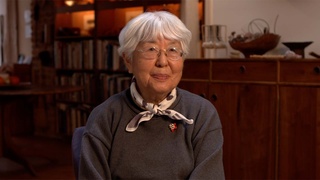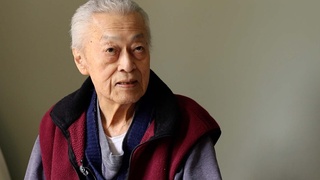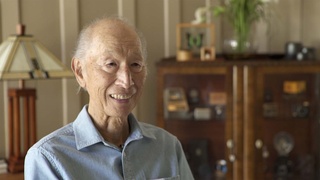Interviews
FBI agents came to the house while parents were gone
And so on that Sunday, he had met – he was meeting his Senryu kai at a...Maneki I think, restaurant in Little Tokyo, and so when the FBI agents came, I think it was very early in the morning – was Pearl Harbor, right? – and they – it was only a few hours after, they came to – there were three agents – and they came to ask my dad, and we said, “He’s not here. He’s in Little Tokyo.”
And so two agents came into the house and one of the agents, I remember, had...says, “Okay, you guys.” And he had this gun in his hand. “You sit over there,” and my brother – two my brother – Tosh and Joe and I had all gone to the door to see who was there. And my mother was still at church, so it was the three of us just there, and my older brother, Mike, was – was ill. And he had contracted tuberculosis in Japan when he went a year prior to that. So he was in bed upstairs, and so they said, “Is there anybody else in the house?” and we said, “Yes,” you know, “We – my brother is upstairs.” And they said, “Well, go and get him,” and so it was – Joe was nine, jumped up, and he was gonna go up the stairs, and he said, “No, sit there. Call him.” And so we called Mike, and he came down in his bathrobe, and joined us, and so the four of us were kind of scrunched up together on the – on the couch.
And the – one of the agent sat on this ottoman in front of us with his gun – I don’t know what he thought we were going to do.
Date: August 7, 2018
Location: California, US
Interviewer: Sharon Yamato
Contributed by: Watase Media Arts Center, Japanese American National Museum
Explore More Videos



The Emotional Toll of Being Incarcerated in Camp during World War II
(b. 1932) Nisei American stage, film, and TV actress

Sister’s Trauma from being Incarcerated during World War II
(b. 1932) Nisei American stage, film, and TV actress

School held emergency drills at the start of World War II
(1934–2018) Japanese American designer, educator, and pioneer of media technologies

Father lost everything during World War II
(1934–2018) Japanese American designer, educator, and pioneer of media technologies

His family Traveled to Japan in 1940
(b. 1938) Japanese American. Hiroshima atomic bomb survivor

His Memory of August 6, 1945
(b. 1938) Japanese American. Hiroshima atomic bomb survivor

Escape from Hiroshima
(b. 1938) Japanese American. Hiroshima atomic bomb survivor

Returning to Hiroshima in ruins
(b. 1938) Japanese American. Hiroshima atomic bomb survivor

Overcoming trauma and speaking about his A-Bomb experience
(b. 1938) Japanese American. Hiroshima atomic bomb survivor

Family having to hide guns during World War II in Colombia
(b.1974) Japanese Colombian who currently resides in the United States

Japanese were treated with dignity during WWII (Spanish)
(b.1974) Japanese Colombian who currently resides in the United States

Enjoying undokai and sports in Crystal City
(b. 1936) Japanese Peruvian incarcerated in Crystal City

Kids activities in Crystal City
(b. 1938) Japanese Peruvian incarcerated in Crystal City
